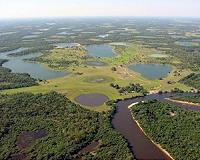 |
Palo Alto CA (SPX) Aug 12, 2010 By 2100 only 18% to 45% of the plants and animals making up ecosystems in global, humid tropical forests may remain as we know them today, according to a new study led by Greg Asner at the Carnegie Institution's Department of Global Ecology. The research combined new deforestation and selective logging data with climate-change projections. It is the first study to consider these combined effects for all humid tropical forest ecosystems and can help conservationists pinpoint where their efforts will be most effective. The study is published in the August 5, 2010, issue of Conservation Letters. "This is the first global compilation of projected ecosystem impacts for humid tropical forests affected by these combined forces," remarked Asner. "For those areas of the globe projected to suffer most from climate change, land managers could focus their efforts on reducing the pressure from deforestation, thereby helping species adjust to climate change, or enhancing their ability to move in time to keep pace with it. On the flip side, regions of the world where deforestation is projected to have fewer effects from climate change could be targeted for restoration." Tropical forests hold more then half of all the plants and animal species on Earth. But the combined effect of climate change, forest clear cutting, and logging may force them to adapt, move, or die. The scientists looked at land use and climate change by integrating global deforestation and logging maps from satellite imagery and high-resolution data with projected future vegetation changes from 16 different global climate models. They then ran scenarios on how different types of species could be geographically reshuffled by 2100.They used the reorganization of plant classes, such as tropical broadleaf evergreen trees, tropical drought deciduous trees, plus different kinds of grasses as surrogates for biodiversity changes. For Central and South America, climate change could alter about two-thirds of the humid tropical forests biodiversity-the variety and abundance of plants and animals in an ecosystem. Combining that scenario with current patterns of land-use change, and the Amazon Basin alone could see changes in biodiversity over 80% of the region. Most of the changes in the Congo area likely to come from selective logging and climate change, which could negatively affect between 35% and 74% of that region. At the continental scale, about 70% of Africa's tropical forest biodiversity would likely be affected if current practices are not curtailed. In Asia and the central and southern Pacific islands, deforestation and logging are the primary drivers of ecosystem changes. Model projections suggest that climate change might play a lesser role there than in Latin America or Africa. That said, the research showed that between 60% and 77% of the area is susceptible to biodiversity losses via massive ongoing land-use changes in the region. "This study is the strongest evidence yet that the world's natural ecosystems will undergo profound changes-including severe alterations in their species composition-through the combined influence of climate change and land use," remarked Daniel Nepstad, senior scientist at the Woods Hole Research Center. "Conservation of the world's biota, as we know it, will depend upon rapid, steep declines in greenhouse gas emissions."
Share This Article With Planet Earth
Related Links Carnegie Institution Forestry News - Global and Local News, Science and Application
 US converts Brazilian debt into environmental protection
US converts Brazilian debt into environmental protectionBrasilia (AFP) Aug 11, 2010 Brazil and the United States have struck a deal under which 21 million dollars in Brazilian debt will be converted into environmental protection programs, the Brazilian government said Wednesday. The accord permits Washington to forgive that amount of debt over the next five years, in exchange for Brasilia using the money to conserve its non-Amazon tropical forests, the Brazilian environment ... read more |
|
| The content herein, unless otherwise known to be public domain, are Copyright 1995-2010 - SpaceDaily. AFP and UPI Wire Stories are copyright Agence France-Presse and United Press International. ESA Portal Reports are copyright European Space Agency. All NASA sourced material is public domain. Additional copyrights may apply in whole or part to other bona fide parties. Advertising does not imply endorsement,agreement or approval of any opinions, statements or information provided by SpaceDaily on any Web page published or hosted by SpaceDaily. Privacy Statement |